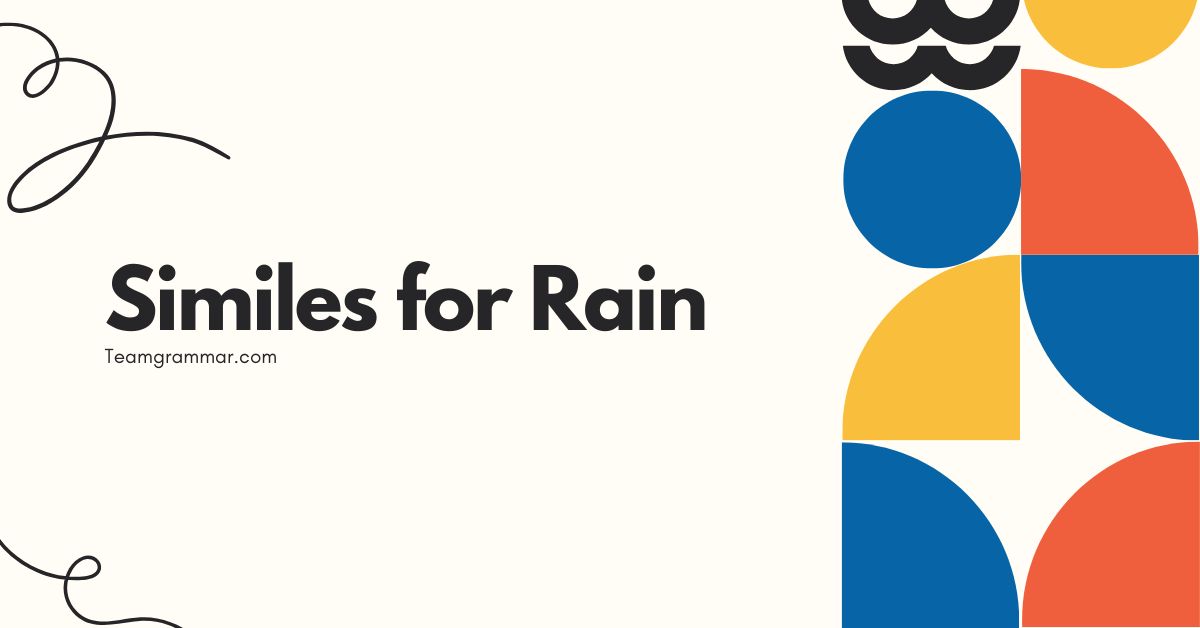39 Similes for Rain: Mastering Figurative Language in English
Understanding similes enhances your ability to express thoughts and ideas vividly. Similes, particularly those describing weather phenomena like rain, add depth and color to writing and speech.
This article explores similes for rain, their grammatical structure, usage, and how to effectively incorporate them into your communication. Whether you’re a student, writer, or language enthusiast, this guide will sharpen your understanding and appreciation of English figurative language.
By delving into the nuances of similes related to rain, you’ll gain a richer vocabulary and a more nuanced understanding of how to craft compelling descriptions. This skill is crucial for creative writing, poetry, and even everyday conversation, allowing you to paint a more vivid picture with your words and connect with your audience on a deeper level.
Table of Contents
- Introduction
- Definition of Simile
- What is a Simile?
- The Function of Similes
- Contexts for Using Similes
- Structural Breakdown of Rain Similes
- Basic Structure: As/Like + Adjective/Noun
- Elements of Comparison
- Implied Meaning
- Types of Rain Similes
- Similes for Light Rain
- Similes for Heavy Rain
- Similes for Gentle Rain
- Similes for Sudden Rain
- Similes for Cold Rain
- Similes for Warm Rain
- Examples of Similes for Rain
- Light Rain Examples
- Heavy Rain Examples
- Gentle Rain Examples
- Sudden Rain Examples
- Cold Rain Examples
- Warm Rain Examples
- Usage Rules for Similes
- Clarity and Relevance
- Cultural Sensitivity
- Avoiding Cliches
- Consistency in Tone
- Common Mistakes with Similes
- Misusing ‘As’ and ‘Like’
- Inappropriate Comparisons
- Overusing Similes
- Practice Exercises
- Exercise 1: Fill in the Blanks
- Exercise 2: Create Your Own Similes
- Exercise 3: Identify the Type of Rain Simile
- Advanced Topics
- Extending Similes into Metaphors
- Using Similes in Poetry
- Similes in Idiomatic Expressions
- FAQ
- Conclusion
Definition of Simile
What is a Simile?
A simile is a figure of speech that directly compares two different things using the words “like” or “as.” The purpose of a simile is to create a vivid image in the reader’s or listener’s mind by drawing a parallel between the characteristics of two unlike objects or concepts. Similes enrich language, making it more descriptive and engaging.
In essence, a simile states that one thing *resembles* another in some way. This resemblance highlights a specific quality or characteristic shared by both, allowing for a deeper understanding and appreciation of the subject being described.
For example, saying “The rain fell like tears” suggests the sadness or cleansing quality associated with tears, enhancing the description of the rain.
The Function of Similes
The primary function of similes is to enhance description and create vivid imagery. By comparing an object or idea to something familiar, similes make abstract concepts more concrete and relatable.
This allows the audience to better understand and visualize the subject being described. Similes also add emotional depth and can evoke specific feelings or associations.
Furthermore, similes can emphasize a particular aspect of the subject. When we say “The rain was as cold as ice,” we’re not just describing the rain; we’re emphasizing its intense coldness.
This focus helps to create a stronger impression on the audience and makes the description more memorable. Similes are, therefore, powerful tools for writers and speakers seeking to engage their audience and convey their message effectively.
Contexts for Using Similes
Similes are versatile and can be used in a wide range of contexts, from creative writing and poetry to everyday conversation and persuasive speeches. In literature, similes are often used to create atmosphere, develop characters, and convey themes.
In everyday speech, they can add color and humor to conversations. In persuasive writing, they can make arguments more compelling by drawing parallels between unfamiliar concepts and familiar ones.
Consider the use of similes in poetry: “The rain whispered like secrets through the trees.” This paints a serene picture and evokes a sense of mystery. In contrast, a simile like “The rain came down as hard as nails” creates a feeling of intensity and discomfort.
The context dictates the appropriate use of similes, and a skilled communicator will choose similes that align with the overall tone and purpose of their message.
Structural Breakdown of Rain Similes
Basic Structure: As/Like + Adjective/Noun
The basic structure of a simile involves comparing two things using the words “as” or “like.” The structure generally follows this pattern: Subject + Verb + “as/like” + Adjective/Noun + Object of Comparison. The object of comparison is what the subject is being compared to.
This structure allows for a clear and direct comparison between the two elements.
For example, in the simile “The rain fell like tears,” “rain” is the subject, “fell” is the verb, “like” is the comparative word, and “tears” is the object of comparison. This simple structure provides a framework for creating countless similes, each with its unique descriptive power.
Understanding this basic structure is key to crafting effective and meaningful similes.
Elements of Comparison
The effectiveness of a simile depends on the elements being compared and the strength of their shared characteristics. The two elements should be distinct enough to make the comparison interesting, but also similar enough to make it meaningful.
The shared characteristic should be clear and relevant to the overall message.
Consider the simile “The rain was as relentless as time.” Here, the shared characteristic is the unstoppable and continuous nature of both rain and time. The comparison is effective because it highlights this key aspect, creating a vivid image of the rain’s persistent nature.
Choosing appropriate and relevant elements of comparison is crucial for creating impactful similes.
Implied Meaning
Similes often carry implied meanings that go beyond the literal comparison. These implied meanings can add depth and complexity to the description, evoking emotions and associations in the audience’s mind.
Understanding these implied meanings is essential for interpreting and appreciating the full impact of a simile.
For instance, the simile “The rain sounded like applause” implies a sense of celebration or approval. The sound of rain, when compared to applause, evokes feelings of joy and recognition.
This implied meaning adds a layer of emotional resonance to the description, making it more impactful than a simple statement about the sound of rain. Recognizing and utilizing implied meanings can elevate the quality of your similes.
Types of Rain Similes
Similes for Light Rain
Light rain, often gentle and subtle, can be described using similes that emphasize its delicate nature. These similes often involve comparisons to soft or quiet things, such as whispers, feathers, or gentle touches.
The goal is to convey the subtlety and peacefulness of a light rain.
Examples of similes for light rain might include: “The rain fell like a gentle mist,” “The rain was as soft as a feather,” or “The rain whispered like secrets through the leaves.” These comparisons evoke a sense of tranquility and delicacy, capturing the essence of a light rain.
Similes for Heavy Rain
Heavy rain, characterized by its intensity and force, requires similes that convey its power and impact. These similes often involve comparisons to strong or overwhelming things, such as waterfalls, storms, or pounding drums.
The aim is to illustrate the sheer force and intensity of the rain.
Similes for heavy rain might include: “The rain poured down like a waterfall,” “The rain was as heavy as lead,” or “The rain beat against the roof like a thousand drums.” These comparisons effectively convey the overwhelming and powerful nature of a heavy downpour.
Similes for Gentle Rain
Gentle rain is often associated with calmness and peace. Similes used to describe gentle rain often evoke feelings of serenity and tranquility.
These similes might compare the rain to a soft lullaby, a gentle caress, or a peaceful melody.
Consider these examples: “The rain fell as gently as a lullaby,” “The rain was like a soft caress on the skin,” or “The rain sounded like a peaceful melody.” These similes highlight the calming and soothing qualities of gentle rain.
Similes for Sudden Rain
Sudden rain, characterized by its unexpected and abrupt arrival, calls for similes that capture its surprise element. These similes often involve comparisons to sudden events or actions, such as an ambush, a burst of energy, or a sudden awakening.
Similes for sudden rain might include: “The rain started as suddenly as an ambush,” “The rain came down like a burst of energy,” or “The rain appeared as abruptly as a sudden awakening.” These comparisons effectively convey the unexpected and startling nature of sudden rain.
Similes for Cold Rain
Cold rain evokes feelings of discomfort and chill. Similes that describe cold rain often involve comparisons to icy or frigid things, such as ice, snow, or a cold shiver.
The goal is to emphasize the biting and uncomfortable nature of the rain.
Examples of similes for cold rain might include: “The rain was as cold as ice,” “The rain felt like a cold shiver down my spine,” or “The rain was like being pelted with tiny icicles.” These comparisons effectively convey the chilling and unpleasant sensations of cold rain.
Similes for Warm Rain
Warm rain, often associated with comfort and relief, requires similes that capture its soothing and pleasant qualities. These similes often involve comparisons to warm or comforting things, such as a warm bath, a gentle hug, or a comforting blanket.
Similes for warm rain might include: “The rain felt like a warm bath,” “The rain was as comforting as a gentle hug,” or “The rain wrapped around me like a comforting blanket.” These comparisons effectively convey the soothing and pleasant sensations of warm rain.
Examples of Similes for Rain
The following tables provide a variety of examples of similes for rain, categorized by the type of rain they describe. Each table includes numerous examples to illustrate the range and versatility of similes.
Light Rain Examples
The table below showcases similes that effectively describe light rain, emphasizing its gentle and subtle qualities.
| Simile | Explanation |
|---|---|
| The rain fell like a gentle mist. | Emphasizes the light and airy quality of the rain. |
| The rain was as soft as a feather. | Highlights the delicate touch of the rain. |
| The rain whispered like secrets through the leaves. | Evokes a sense of quiet and mystery. |
| The rain kissed the earth like a lover’s touch. | Suggests a tender and affectionate quality. |
| The rain drifted down like cottonwood seeds. | Conveys a slow and gentle descent. |
| It rained like a soft, mournful song. | Implies a quiet, melancholic feeling. |
| The drizzle was as fine as powdered sugar. | Highlights the delicate and almost imperceptible nature of the rain. |
| Light rain tapped on the window like a hesitant visitor. | Portrays the rain as tentative and unobtrusive. |
| The rain fell like a veil over the landscape. | Creates an image of the rain subtly obscuring the view. |
| The light rain was as soothing as a mother’s hum. | Suggests comfort and peace. |
| The rain was like a gentle curtain of water. | Paints a picture of a thin, watery barrier. |
| It rained as if the sky was crying softly. | Personifies the rain as a gentle expression of sadness. |
| The rain was as quiet as a mouse. | Highlights the almost silent nature of the rain. |
| The rain fell like dew on a spider’s web. | Evokes an image of delicate droplets. |
| The light rain felt like a cool breath on the skin. | Suggests a refreshing and gentle sensation. |
| The rain was as light as a butterfly’s wing. | Emphasizes the weightless quality of the rain. |
| It rained like a soft lullaby. | Creates an atmosphere of peace and calm. |
| The rain was as subtle as a watercolor painting. | Highlights the delicate and understated nature of the rain. |
| The rain touched the leaves like a gentle hand. | Suggests a tender and caring action. |
| The light rain fell like a blessing. | Implies a sense of grace and favor. |
| The rain was as light as fairy dust sprinkling from the sky. | Evokes a magical and whimsical feeling. |
| The light rain felt like a cool spritz of perfume. | Suggests a refreshing and pleasant sensation. |
| The rain was as gentle as a sigh. | Highlights the quiet and almost imperceptible nature of the rain. |
| It rained like the earth was exhaling softly. | Personifies the rain as a gentle release. |
| The rain fell like a soft, continuous kiss. | Suggests a tender and affectionate quality. |
Heavy Rain Examples
The table below provides similes that effectively describe heavy rain, emphasizing its intensity and force.
| Simile | Explanation |
|---|---|
| The rain poured down like a waterfall. | Emphasizes the sheer volume and force of the rain. |
| The rain was as heavy as lead. | Highlights the weight and density of the rain. |
| The rain beat against the roof like a thousand drums. | Evokes a sense of loud and relentless noise. |
| The rain came down like a deluge. | Suggests an overwhelming and catastrophic amount of rain. |
| The rain lashed against the windows like an angry sea. | Conveys a sense of violence and fury. |
| It rained like the sky was falling. | Implies a sense of chaos and destruction. |
| The rain was as intense as a raging storm. | Highlights the power and ferocity of the rain. |
| The heavy rain pounded the earth like a blacksmith’s hammer. | Portrays the rain as forceful and unyielding. |
| The rain descended like a curtain of water. | Creates an image of an impenetrable watery barrier. |
| The heavy rain was as relentless as a ticking clock. | Suggests an unstoppable and continuous force. |
| The rain was like a torrent unleashed from the heavens. | Paints a picture of a powerful and uncontrolled downpour. |
| It rained as if the sky was emptying its entire contents. | Implies an immense and exhaustive amount of rain. |
| The rain was as deafening as a roaring waterfall. | Highlights the overwhelming noise of the rain. |
| The rain fell like bullets from the sky. | Evokes an image of sharp and dangerous projectiles. |
| The heavy rain felt like a constant barrage. | Suggests a relentless and overwhelming assault. |
| The rain was as forceful as a hurricane. | Emphasizes the destructive power of the rain. |
| It rained like a tropical storm had arrived. | Creates an atmosphere of intense and dramatic weather. |
| The rain was as overwhelming as a tidal wave. | Highlights the immense and unstoppable nature of the rain. |
| The rain crashed down like a collapsing building. | Suggests a destructive and devastating force. |
| The heavy rain fell like a punishment. | Implies a sense of severity and retribution. |
| The rain was as heavy as a lead blanket smothering the city. | Evokes a feeling of oppression and confinement. |
| The rain felt like being trapped under a waterfall. | Suggests a sense of being overwhelmed and powerless. |
| The rain was as relentless as a charging army. | Highlights the unstoppable and aggressive nature of the rain. |
| It rained like the world was being washed away. | Implies a sense of cleansing and renewal through destruction. |
| The rain fell like a violent, unending curtain. | Suggests a forceful and relentless barrier. |
Gentle Rain Examples
The table below showcases similes that effectively describe gentle rain, emphasizing its calming and peaceful qualities.
| Simile | Explanation |
|---|---|
| The rain fell as gently as a lullaby. | Emphasizes the soothing and calming quality of the rain. |
| The rain was like a soft caress on the skin. | Highlights the tender and gentle touch of the rain. |
| The rain sounded like a peaceful melody. | Evokes a sense of tranquility and harmony. |
| The rain felt like a gentle embrace. | Suggests comfort and warmth. |
| The rain cleansed the air like a refreshing balm. | Conveys a sense of purification and renewal. |
| It rained like the earth was being blessed. | Implies a sense of grace and favor. |
| The rain was as calming as a meditation session. | Highlights the peaceful and relaxing nature of the rain. |
| The gentle rain felt like a cool hand on a fevered brow. | Portrays the rain as comforting and relieving. |
| The rain washed over the landscape like a gentle wave. | Creates an image of a soothing and cleansing motion. |
| The gentle rain was as comforting as a warm cup of tea. | Suggests relaxation and solace. |
| The rain was like a whispered secret of the earth. | Paints a picture of a quiet and intimate communication. |
| It rained as if the sky was shedding tears of joy. | Implies a sense of happiness and relief. |
| The rain was as soft as a kitten’s purr. | Highlights the gentle and comforting sound of the rain. |
| The rain fell like a gentle shower of blessings. | Evokes an image of grace and abundance. |
| The gentle rain felt like a soft kiss from nature. | Suggests a tender and affectionate touch. |
| The rain was as soothing as a gentle breeze. | Emphasizes the calming and peaceful nature of the rain. |
| It rained like a soft song played on repeat. | Creates an atmosphere of continuous and gentle sound. |
| The rain was as tender as a mother’s love. | Highlights the caring and nurturing qualities of the rain. |
| The rain touched the flowers like a gentle gardener. | Suggests a careful and nurturing action. |
| The gentle rain fell like a peaceful dream. | Implies a sense of serenity and tranquility. |
| The rain was as light as a feather’s descent from the heavens. | Evokes a feeling of delicate and ethereal beauty. |
| The gentle rain felt like a refreshing mist on a summer’s day. | Suggests a cool and invigorating sensation. |
| The rain was as quiet as a sleeping child. | Highlights the peaceful and undisturbed nature of the rain. |
| It rained like the world was being hushed to sleep. | Personifies the rain as a comforting and calming presence. |
| The rain fell like a comforting memory. | Suggests a sense of nostalgia and warmth. |
Sudden Rain Examples
The table below presents similes that describe sudden rain, focusing on its unexpected and abrupt qualities.
| Simile | Explanation |
|---|---|
| The rain started as suddenly as an ambush. | Emphasizes the unexpected and surprising nature of the rain. |
| The rain came down like a burst of energy. | Highlights the sudden and forceful arrival of the rain. |
| The rain appeared as abruptly as a sudden awakening. | Evokes a sense of being startled and caught off guard. |
| The rain began like a surprise attack. | Suggests a sudden and overwhelming force. |
| The rain descended as quickly as a falling curtain. | Conveys a sense of rapid and sudden descent. |
| It rained like a switch had been flipped. | Implies an immediate and abrupt change. |
| The rain started as suddenly as a dropped bucket of water. | Highlights the immediate and unexpected nature of the rain. |
| The rain began like a cold splash in the face. | Portrays the rain as a startling and invigorating experience. |
| The rain arrived as unexpectedly as a pop quiz. | Creates a sense of surprise and unpreparedness. |
| The sudden rain was like a jolt from a sleeping dream. | Suggests a rude and abrupt awakening. |
| The rain came out of nowhere like a magician’s trick. | Paints a picture of an inexplicable and sudden appearance. |
| It rained as if the sky had suddenly burst open. | Implies an immediate and overwhelming release. |
| The rain started as suddenly as a fire alarm going off. | Highlights the startling and attention-grabbing nature of the rain. |
| The rain fell like a lightning strike from a clear sky. | Evokes an image of a sudden and unexpected event. |
| The sudden rain felt like a cold slap. | Suggests a shocking and unpleasant sensation. |
| The rain was as unexpected as a door slamming shut. | Emphasizes the sudden and startling nature of the rain. |
| It rained like someone had turned on a giant faucet. | Creates an atmosphere of instantaneous and plentiful water. |
| The rain was as surprising as a jack-in-the-box. | Highlights the unexpected and startling appearance of the rain. |
| The rain began without warning, like a sudden sneeze. | Suggests an involuntary and abrupt action. |
| The sudden rain fell like a curtain dropping on a stage. | Implies a sudden and complete change of scene. |
| The rain was as startling as a loud clap of thunder. | Evokes a feeling of surprise and alarm. |
| The sudden rain felt like a bucket of ice water being thrown. | Suggests a shocking and uncomfortable sensation. |
| The rain was as immediate as a reflex. | Highlights the instantaneous nature of the rain’s arrival. |
| It rained as though the sky had no patience left. | Implies a rapid and forceful release. |
| The rain fell like a cold, unwelcome surprise. | Suggests a shocking and unpleasant experience. |
Cold Rain Examples
The table below lists similes that effectively describe cold rain, emphasizing its chilling and uncomfortable qualities.
| Simile | Explanation |
|---|---|
| The rain was as cold as ice. | Emphasizes the frigid temperature of the rain. |
| The rain felt like a cold shiver down my spine. | Highlights the chilling sensation of the rain. |
| The rain was like being pelted with tiny icicles. | Evokes an image of sharp and painful impacts. |
| The rain felt like a thousand needles pricking my skin. | Suggests a sharp and stinging sensation. |
| The rain was as biting as a winter wind. | Conveys a sense of harsh and penetrating cold. |
| It rained like the sky was weeping tears of ice. | Implies a frigid and sorrowful atmosphere. |
| The rain was as frigid as a glacier. | Highlights the intensely cold nature of the rain. |
| The cold rain felt like a frozen hand gripping my body. | Portrays the rain as an uncomfortable and constricting force. |
| The rain washed over me like a wave of liquid ice. | Creates an image of an intensely cold and overwhelming sensation. |
| The cold rain was as harsh as a blizzard. | Suggests a severe and unforgiving weather condition. |
| The rain was like shards of glass falling from the sky. | Paints a picture of sharp and painful impacts. |
| It rained as if the sky was trying to freeze the earth. | Implies an attempt to create a frozen and inhospitable environment. |
| The rain was as bitter as a frozen wasteland. | Highlights the bleak and inhospitable nature of the rain. |
| The rain felt like a cold, unwelcome embrace. | Evokes a sense of discomfort and rejection. |
| The cold rain felt like being trapped in a freezer. | Suggests a chilling and confined experience. |
| The rain was as unforgiving as a winter storm. | Emphasizes the harsh and relentless nature of the rain. |
| It rained like the heavens were throwing down frozen tears. | Creates an atmosphere of sadness and intense cold. |
| The rain was as sharp as a razor’s edge. | Highlights the biting and penetrating quality of the rain. |
| The rain felt like a cold knife against my skin. | Suggests a painful and cutting sensation. |
| The cold rain fell like a curse. | Implies a sense of misfortune and suffering. |
| The rain was as icy as a polar bear’s plunge. | Evokes an image of extreme cold and shock. |
| The cold rain felt like a thousand icy fingers touching me. | Suggests a chilling and unsettling sensation. |
| The rain was as unwelcoming as a frozen landscape. | Highlights the inhospitable and desolate nature of the rain. |
| It rained as though the sky was shedding tears of ice. | Implies a frigid and sorrowful atmosphere. |
| The rain felt like a freezing mist settling onto everything. | Suggests a penetrating and chilling dampness. |
Warm Rain Examples
The table below presents similes that describe warm rain, highlighting its soothing and pleasant qualities.
| Simile | Explanation |
|---|---|
| The rain felt like a warm bath. | Emphasizes the comforting and soothing temperature of the rain. |
| The rain was as comforting as a gentle hug. | Highlights the sense of warmth and security. |
| The rain wrapped around me like a comforting blanket. | Evokes a feeling of being enveloped in warmth. |
| The rain felt like a soft, warm kiss. | Suggests a tender and affectionate touch. |
| The rain was as gentle as a summer breeze. | Conveys a sense of mildness and comfort. |
| It rained like the sky was giving a warm embrace. | Implies a sense of comfort and affection. |
| The rain was as soothing as a warm cup of tea. | Highlights the relaxing and comforting nature of the rain. |
| The warm rain felt like a gentle hand caressing my skin. | Portrays the rain as a tender and comforting touch. |
| The rain washed over me like a warm wave. | Creates an image of a comforting and enveloping sensation. |
| The warm rain was as inviting as a cozy fireplace. | Suggests a sense of warmth and welcome. |
| The rain was like a warm shower on a summer’s day. | Paints a picture of a refreshing and pleasant experience. |
| It rained as if the sky was shedding tears of warmth. | Implies a comforting and gentle release. |
| The rain was as mild as a spring day. | Highlights the gentle and pleasant nature of the rain. |
| The rain felt like a warm |
Usage Rules for Similes
Using similes effectively requires attention to detail and an understanding of their impact on the audience. The following rules will help you craft similes that are clear, relevant, and impactful.
Clarity and Relevance
Ensure that your similes are clear and easy to understand. The comparison should be obvious and the connection between the two elements should be readily apparent.
The simile should also be relevant to the context and enhance the overall message.
For example, “The rain fell like tears” is clear and relevant because it connects the appearance and emotional connotations of tears to the rain. However, “The rain fell like a bicycle” would be confusing and irrelevant because there is no clear connection between rain and a bicycle.
Cultural Sensitivity
Be mindful of cultural differences and avoid using similes that may be offensive or insensitive to certain groups. Comparisons that are based on stereotypes or cultural misunderstandings can be harmful and undermine your message.
For instance, a simile that compares rain to a natural disaster in a region prone to such events could be insensitive to those who have experienced the devastation firsthand. Always consider the potential impact of your similes on diverse audiences.
Avoiding Cliches
Cliches are overused expressions that have lost their impact due to overuse. Avoid using common or predictable similes, such as “The rain fell like cats and dogs.” Instead, strive to create fresh and original comparisons that will capture the audience’s attention.
To avoid cliches, think creatively and look for unique connections between the rain and other elements. For example, instead of “The rain fell like cats and dogs,” try “The rain hammered down like a blacksmith’s forge,” which is more vivid and original.
Consistency in Tone
Ensure that your similes are consistent with the overall tone of your writing or speech. A simile that is too humorous or lighthearted may be inappropriate in a serious or somber context, and vice versa.
Maintain a consistent tone to create a cohesive and impactful message.
For example, in a serious poem about loss, a simile like “The rain cried like a heartbroken child” would be appropriate, while “The rain danced like a clown” would be jarring and out of place.
Common Mistakes with Similes
Even experienced writers can make mistakes when using similes. Being aware of these common pitfalls can help you avoid them and craft more effective comparisons.
Misusing ‘As’ and ‘Like’
The words “as” and “like” are the building blocks of similes, but they must be used correctly. “Like” is used to compare nouns or pronouns, while “as” can be used in various constructions, including comparisons with clauses.
Misusing these words can lead to awkward or incorrect similes.
Incorrect: The rain fell as a waterfall. The rain fell as a waterfall.
Correct: The rain fell like a waterfall. The rain fell like a waterfall.
Incorrect: The rain was gentle like it could be. The rain was gentle like it could be.
Correct: The rain was as gentle as it could be. The rain was as gentle as it could be.
Inappropriate Comparisons
An inappropriate comparison occurs when the two elements being compared are too dissimilar or when the shared characteristic is unclear or irrelevant. This can lead to confusion or a lack of impact.
Inappropriate: The rain was like a refrigerator. The rain was like a refrigerator. (No clear connection)
Improved: The rain was as cold as a refrigerator. The rain was as cold as a refrigerator. (Highlights a specific shared characteristic)
Overusing Similes
While similes can enhance your writing, using too many can make it seem forced or artificial. Use similes sparingly and only when they add significant value to your description.
Overuse can distract the reader and diminish the impact of each individual comparison.
Overuse:The rain fell like tears, and the sky was as gray as a stone. The wind howled like a wolf, and the trees swayed like dancers.The rain fell like tears, and the sky was as gray as a stone.
The wind howled like a wolf, and the trees swayed like dancers.Improved:The rain fell, and the gray sky mirrored the somber mood.The rain fell, and the gray sky mirrored the somber mood.(More concise and impactful)
Practice Exercises
To solidify your understanding of similes for rain, try these exercises. They will help you practice identifying, creating, and using similes effectively.
Exercise 1: Fill in the Blanks
Complete the following sentences with appropriate similes for rain.
- The rain fell ____________________.
- The cold rain felt ____________________.
- The sudden rain started ____________________.
Possible Answers:
- The rain fell like a gentle mist.
- The cold rain felt like ice on my skin.
- The sudden rain started as suddenly as an ambush.
Exercise 2: Create Your Own Similes
Write three original similes to describe different types of rain (light, heavy, warm).
Possible Answers:
- Light Rain: The rain was as soft as a whisper.
- Heavy Rain: The rain pounded the earth like a drum solo.
- Warm Rain: The rain felt like a comforting embrace.
Exercise 3: Identify the Type of Rain Simile
Identify the type of rain (light, heavy, gentle, sudden, cold, warm) being described in each simile.
- The rain was as cold as ice.
- The rain fell as gently as a lullaby.
- The rain came down like a waterfall.
Answers:
- Cold Rain
- Gentle Rain
- Heavy Rain
Advanced Topics
Once you have mastered the basics of similes, you can explore more advanced techniques to further enhance your writing.
Extending Similes into Metaphors
A simile can be extended into a metaphor by removing the words “as” or “like” and directly equating the two elements. This creates a stronger and more impactful comparison.
Simile: The rain fell like tears.
Extended Metaphor: The rain was the sky’s tears, a sorrowful outpouring that cleansed the earth.
Using Similes in Poetry
Similes are a powerful tool in poetry for creating vivid imagery and conveying emotions. They can be used to enhance the poem’s theme, develop its mood, and engage the reader’s senses.
Example:
The rain, a silver curtain falling,
Whispers secrets to the sleeping land,
Each drop, like a pearl, enthralling,
A gentle touch from heaven’s hand.
Similes in Idiomatic Expressions
Many idiomatic expressions use similes to convey a specific meaning. Understanding these expressions can enrich your vocabulary and improve your comprehension of English.
Examples:
- Right as rain: Meaning in perfect condition.
- To fit like a glove: Meaning to fit perfectly.
FAQ
Here are some frequently asked questions about using similes for rain.
What is the difference between a simile and a metaphor?
A simile compares two things using “as” or “like,” while a metaphor directly equates them without using these words.
How can I avoid using cliches in my similes?
Think creatively and look for unique connections between the rain and other elements. Avoid common or predictable comparisons.
Can I use similes in formal writing?
Yes, but use them sparingly and ensure they are appropriate for the tone and context of your writing.
Conclusion
Mastering the art of using similes for rain can greatly enhance your ability to describe and evoke emotions related to this common weather phenomenon. By understanding the structure, types, and usage rules of similes, you can craft vivid and impactful comparisons that will engage your audience and enrich your writing.
Remember to be clear, relevant, and creative in your comparisons, and avoid common mistakes such as overusing similes or using cliches. With practice, you can become proficient in using similes to paint a more vivid and compelling picture of rain in all its forms.







